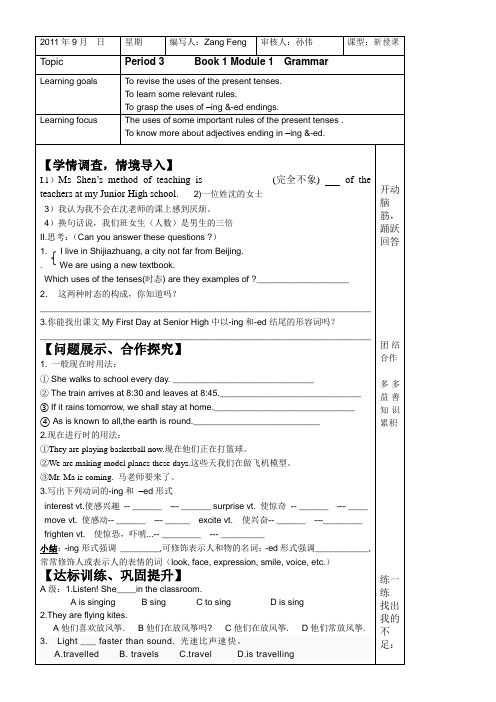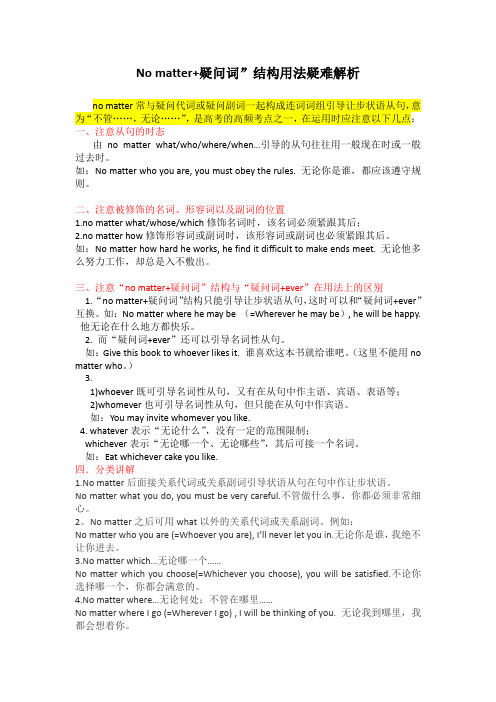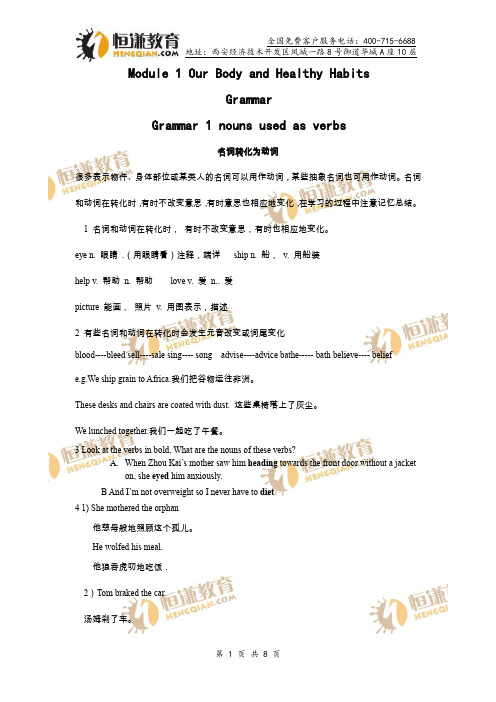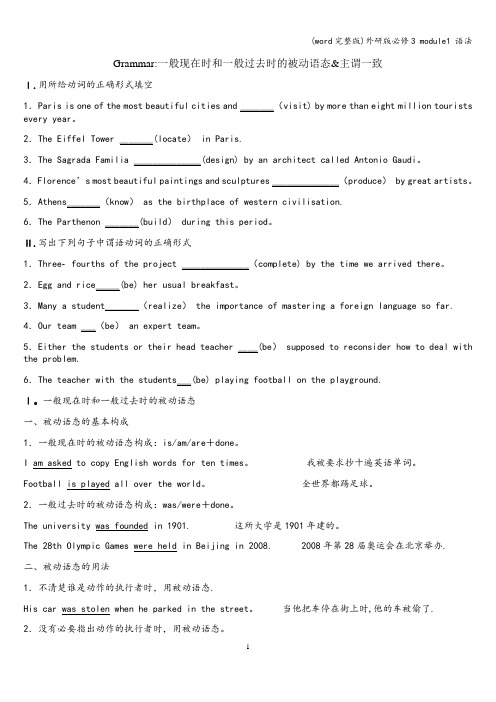Module 1 Grammar
山东省淄川般阳中学高一英语《Module 1 Grammar 》学案

The uses of some importantrulesof the present tenses.
To know more aboutadjectives ending in –ing &-ed.
【学情调查,情境导入】
I.1)Ms Shen’s method of teaching is ________ ____(完全不象)___of the teachers at my Junior High school.2)一位姓沈的女士
2.现在进行时的用法:
They are playing basketball now.现在他们正在打篮球。
We are making model planes these days.这些天我们在做飞机模型。
Mr. Ma is coming.马老师要来了。
3.写出下列动词的-ing和–ed形式
interest vt.使感兴趣-- ______ --- ______ surprise vt.使惊奇-- ______ --- ____
The train arrives at 8:30 and leaves at 8:45._____________________________
If it rains tomorrow, we shall stay at home._____________________________
As is knownto all,the earth is round.__________________________
8.The students will go to theSummerPalaceif it ___ rain.
A. don’t rain B. doesn’t rain C. won’t rain D. isn’t raining
外研版必修四module1 grammar1 (一)no matter 引导的让步状语从句

No matter+疑问词”结构用法疑难解析no matter常与疑问代词或疑问副词一起构成连词词组引导让步状语从句,意为“不管……,无论……”,是高考的高频考点之一,在运用时应注意以下几点:一、注意从句的时态由no matter what/who/where/when…引导的从句往往用一般现在时或一般过去时。
如:No matter who you are, you must obey the rules. 无论你是谁,都应该遵守规则。
二、注意被修饰的名词、形容词以及副词的位置1.no matter what/whose/which修饰名词时,该名词必须紧跟其后;2.no matter how修饰形容词或副词时,该形容词或副词也必须紧跟其后。
如:No matter how hard he works, he find it difficult to make ends meet. 无论他多么努力工作,却总是入不敷出。
三、注意“no matter+疑问词”结构与“疑问词+ever”在用法上的区别1. “no matter+疑问词”结构只能引导让步状语从句,这时可以和“疑问词+ever”互换。
如:No matter where he may be (=Wherever he may be), he will be happy. 他无论在什么地方都快乐。
2. 而“疑问词+ever”还可以引导名词性从句。
如:Give this book to whoever likes it. 谁喜欢这本书就给谁吧。
(这里不能用no matter who。
)3.1)whoever既可引导名词性从句,又有在从句中作主语、宾语、表语等;2)whomever也可引导名词性从句,但只能在从句中作宾语。
如:You may invite whomever you like.4. whatever表示“无论什么”,没有一定的范围限制;whichever表示“无论哪一个、无论哪些”,其后可接一个名词。
英语:module1 grammar教案(外研版必修2)

Module 1 Our Body and Healthy HabitsGrammarGrammar 1 nouns used as verbs名词转化为动词很多表示物件、身体部位或某类人的名词可以用作动词,某些抽象名词也可用作动词。
名词和动词在转化时,有时不改变意思,有时意思也相应地变化,在学习的过程中注意记忆总结。
1 名词和动词在转化时,有时不改变意思,有时也相应地变化。
eye n. 眼睛.(用眼睛看)注释,端详ship n. 船,v. 用船装help v. 帮助n. 帮助love v. 爱n.. 爱picture 能画,照片v. 用图表示,描述2 有些名词和动词在转化时会发生元音改变或词尾变化blood----bleed sell----sale sing---- song advise----advice bathe----- bath believe---- beliefe.g.We ship grain to Africa.我们把谷物运往非洲。
These desks and chairs are coated with dust. 这些桌椅落上了灰尘。
We lunched together.我们一起吃了午餐。
3 Look at the verbs in bold. What are the nouns of these verbs?A.When Zhou Kai’s mother saw him heading towards the front door without a jacketon, she eyed him anxiously.B And I’m not overweight so I never have to diet4 1) She mothered the orphan他慈母般地照顾这个孤儿。
He wolfed his meal.他狼吞虎叨地吃饭.2)Tom braked the car.汤姆刹了车。
外研版高中英语必修5 Module1 Grammar精品课件

训 练
·
·
突 破
2. 表示现在的状态或情况。如句 ③。
达 标
3. 表示一个按规定、计划、安排要发生的动作, 这类词有: go, come, arrive, leave, start, begin等。如句②。
语 4. 表示客观事实、科学真理、格言等。如句 ④。
课
法
堂
探 5. 在时间状语从句或条件状语从句中, 用一般现在时表示将来。 训
4. be about to表示“立即的将来”, 该句型很少与表示将来的
语 法
具体时间连用, 但可以和when引导的状语从句连用。如句④。
课 堂
探
训
究 ·
5. come, go, leave, arrive, start等词也可以用一般现在时和现
练 ·
突 破
在进行时表示将来。如句⑤。
达 标
语 法 探
语
课
法
探 ①We will go to the park if it doesn’t rain tomorrow.
堂 训
究
练
· 突
②The shop opens at 7: 30 am, and closes at 9: 30 pm.
· 达
破
标
③Her sister is busy at the moment.
语
法
探
究 A. made
·
突 破
C. makes
[2011全国卷Ⅰ] 课
堂
训
B. is making
练
·
D. has made
达 标
【解析】选C。考查一般现在时的用法。句意: 提前这么早计 划是没有意义的——有很多事情在明年会发生变化。用一般 现在时表示现在的情况。
外研八年级上册Module 1 Grammar重点语法一般现在时,一般过去时,一般将来时与现在进行时

班级姓名学号分数Module 1 How to learn English一般现在时,一般过去时,一般将来时与现在进行时(时间:60分钟,满分:100分)一、单项选择(本大题共40小题,每小题1.5分,共60分)1.The kangaroo ________ from ________.A.come; Australia B.comes; AustraliaC.comes; Australian D.come; Australian2.—Do you have an art lesson today?—Yes. And it _________ at 12:00. Then we can have lunch.A.finish B.finishing C.to finish D.finishes 3.— Does your father like hamburgers for dinner?— No, he _________. He always eats healthy food.A.is B.does C.isn’t D.doesn’t 4.Everyone in my class ________ sports.A.enjoy B.is like C.like D.enjoys5.Turn off the tap. The pot ________ water.A.was full of B.is full of C.was filled with D.is filled of 6.My dog likes________, but it never _______ me.A.to bark; bark at B.barking; barkC.barking; barks at D.barking at; barks7.Listen! ________ you ________ someone screaming?A.Are; hear B.Are; hearing C.Did; hear D.Do; hear 8.Jim would like ________ a doctor when he ________ up.A.to be; grows B.be; will growC.being; grows D.to be; will grow9.Sandy, please tell me what ________ you. Maybe I can help you.A.worrying B.worriesC.worries about D.worried about10.My school is a little far from my home. It often ________ me half an hour ________ there.11.—I hear Jackie Chan will come to Wuxi next week.—Really? ________ he ________, my sister will be very happy.A.If; comes B.If; will come C.Before; come D.Till; comes 12.—Jim, you ________ late again!—Sorry, I ________ next time.A.are; don’t B.will be; won’t C.are; won’t D.will be; don’t 13.Tom ______ to go far if he _______ some help. Our house is next to his. A.doesn’t need; need B.needn’t; needs C.doesn’t need; needs D.needn’t; need 14.The teachers in our school each ________ a computer now.A.are having B.have C.is having D.has 15.—Here comes the bus! Where is our principal?—She can’t go to the museum with us. She ________ some visitors around our school. A.is showing B.shows C.has showed D.was showing 16.—Listen, our teachers _________ Red Songs in the next room.—Yes. Let’s go and have a look.A.sing B.sings C.sang D.are singing 17.—Lucy, can you help me cook dinner?—Oh, sorry, Mom. I __________ my clothes.A.am washing B.wash C.washed D.to wash 18.Look, the children ________ the flowers in the garden.A.are watering B.water C.watered D.will water 19.—Excuse me, where is Miss Smith?—She ________ on the phone outside the office now.A.talks B.talked C.is talking D.was talking 20.—Tom, I need your help!—Oh, sorry, Mr. Li. I _______ the classroom.A.clean B.am cleaning C.cleans D.to clean 21.—Listen! Who ________ in the next room?—I don’t know.A.sing B.sings C.singing D.is singing 22.—May I speak to Mr. Brown?A.take B.takes C.is taking D.are taking23.The Whites ________ TV now.A.are watching B.watches C.watching D.is watching24.—Where are you going, Tom?—To play football. Mike ________ for me at the school gate at present.A.waits B.waited C.is waiting D.will wait25.—Keep quiet, kids. Dad ________ in the next room.—OK, Mum.A.sleep B.sleeps C.has slept D.is sleeping26.—What did they do last weekend?—They ________ in the park.A.went a boat B.went to a boat C.went boating D.took boating27.—________ he ________ to school?—Yes, he did. He was late.A.Does; hurry B.Did; hurry C.Was; hurried D.Were; hurry28.I ________ but ________ nothing.A.was listened; was hearing B.listened; heard C.listen;heard D.heard; listened to 29.When I passed the music room, I ________ some students ________ a beautiful song.A.hear; are singing B.hear; singing C.heard; singing D.heard; are singing30.—________ you born in Cambridge?—No. I ________ born in Canada.A.Was, were B.Were, was C.Are, am D.Were, wasn’t31.—Excuse me, don’t you see the sign “No smoking” on the wall?—Sorry, I ________ it.A.don’t see B.didn’t see C.don’t look at D.didn’t look at32.________ a concert next Saturday?A.Will there have B.Will there be C.Is there going to have D.Is there having 33.—Where is the morning paper?—I ________ it for you at once.A.get B.am getting C.to get D.will get34.He _______ very busy today. He _______ free next week.35.—Will there be a concert in People’s Theatre next week?— ________. Let’s go together.A.Yes, there is B.No, there isn’t C.Yes, there will D.No, there won’t 36.—________ a tall teaching building in our school in the future?—I am not sure.A.Will there be B.Will there is C.Will there have D.Will there has 37.There’s going to ________ in tomorrow’s newspaper.A.have something interesting B.have interesting somethingC.be something interesting D.be interesting something38.They will ________ finish the work tomorrow.A.can B.could C.be able to D.are able to 39.There ________ a football match this evening.A.is going to have B.will have C.is going to be D.will be have 40.They ________ to the museum three days ago. They ________ there again tomorrow. A.will go; went B.go; will go C.went; will go D.went; went 二、用所给单词的正确形式填空(本大题共40小题,每小题1分,共40分)41.I think he ________ (become) a good basketball player in ten years.42.Michael __________ (teach) in a school in Yunnan from February to June next year. 43.—Are you going ________(see) your brother?—Yes, I am.44.We ________ at the school gate at eight o’clock tomorrow.(meet)45.There ________ (be) a sports meeting tomorrow morning in our school.46.We _____ (camp) by the lake. It was quite good.47.I ________ (wake) up suddenly because of a nightmare (恶梦) last night.48.Last weekend, our parents ______(take) us to China to visit the Great Wall.49.They said “hello” to each other and then _____(sit) down.50.The children ______(fly) kites in the park happily yesterday afternoon.51.They ______(forget) to do their homework last weekend.52.—Who ________ (pay) for you to go to France?—My parents did.53.The man jumped off his bike and ________ (hide) himself behind the bushes quickly.55.Yesterday he saw me and ________(nod) to me in front of the library. 56.Yesterday I stayed at home and ________(read) Alice in Wonderland.57.Your English sounds great. Who ________ (teach) you? Did you learn it by yourself? 58.This city ________ (build) a new library for the blind now.59.It’s 10:30 a.m. Susan and her sister are still ________(sleep).60.Peter is ________ (print) the documents at the moment.61.There is a cat _________ (lie) in the basket.62.Look! They ________ (dig) a hole.63.— Excuse me, can I talk with your manager now?— I’m afraid not. He ________ (speak) at an important meeting.64.Look! The dog is ________ (cross) the street to run after the cat.65.—Where is Sandy?—Oh, She _________ (practise) basketball with other team members.66.I can’t go out with you. I _________ (wash) my clothes now.67.The twins ________ (do) their homework in their bedroom at the moment.68.I will take a photo of you when you are ________ (dance).69.Be quiet! The little boy ________ (sleep) now.70.I often ________ (buy) gifts for my parents on their birthdays.71.________ he ________ (clean) the windows once a week?72.My lovely pet never ________ (worry) because we take good care of her. 73.— How about playing basketball?— ________(sound) great.74.My favorite subjects ________(be) science and music.75.—Who ________ (cook) meals in your family?—My mother.76.She is very famous and she often ________ (appear) on TV.77.The father usually ________ (fly) a kite with his son in spring every year.78.V atersay hasn’t got a school, but she ________ (teach) herself at home. 79.“Where is my schoolbag?” Tom always ________ (ask) his mother.80.There ________ (be) a pen and three books on my desk.参考答案:1.B【解析】句意:这只袋鼠来自澳大利亚。
Module 1 Unit 1 Grammar

3) Mary is a student who is 21 years old.
定语
分析定语与它说修饰的名词的位置关系(前、后), 有什么规律?
Module 1 Unit 1 Grammar : Attributive Clause
通常单个的单词做定语放在名词的前面;而短语 或从句做定语放在名词的后面。
Module 1 Unit 1 Grammar : Attributive Clause
定语从句三要素:
1. 先行词(antecedent). 2. 关系代词(that, which, who, whom, whose); 关系副词(where, when, why) 3.关系代词或关系副词代替先行词在定语从句中充 当的句子成分. 定语从句的核心: 关系代词或关系副词代替先行词在定语从句中充当 的句子成分。
1)Mary is a 21-year-old student. (名词的前面) She is a nice girl.(名词的前面) 2) Mary is a student 21 years old. (名词的后面) Mary is a student in her twenties. (名词的后面) 3) Mary is a student who is 21 years old. (名词的后 面)
Module 1 Unit 1 Grammar : Attributive Clause
[即时演练2] 使用定语从句合并句子,并说出关系词that在从句中作什么成分 ①This is the house.Lu Xun once lived in the house. →This is the house that Lu Xun once lived in .(that在定语从句中 作 宾语 ) ②Jack is no longer a lazy boy.He used to be a lazy boy. →Jack is no longer a lazy boy that he used to be .(that在定语从句中 作 表语 ) ③The boy is Tom.The boy is studying in the classroom. →The boy that is studying in the classroom is Tom.(that在定语从句 中作 主语 )
外研版七年级英语下册单元语法专练-01Module1-Grammar物主代词的用法(专练+答案)

Module 1 Lost and found.Grammar 物主代词的用法(时间:100分钟,满分:100分)一、单项选择(本大题共40小题,每小题1.5分,共60分)1.—Is this ________ card, Tony?— Yes, ________ is.A.you; this B.you; it C.your; this D.your; it 2.—Are those your friends?—No, they are my brothers. _________ names are Charles and Luke.A.They B.Their C.Them D.Theirs 3.—Is that eraser your sister’s?—No, _________ is on the desk. It’s my eraser.A.she B.her C.hers4.—Is this ________ pencil?—Yes, it’s________.A.your; mine B.your; my C.her; mine D.his; hers 5.Jim is Lily’s brother. ______ favourite subject is PE.A.My B.Your C.His D.Her 6.________ am Anna. _________ name is Kate.A.My; She B.My; Her C.I; Her7.This isn’t ________ pen. I left ________ at home this morning.A.me,my B.my,IC.mine,myself D.my,mine8.—Excuse me, Jack. Is this your dictionary?—Yes, it is. It’s ________.A.I B.mine C.me D.my 9.This is not ________ watch. I think it’s ________ watch.A.you, he B.his, her C.she, my D.me, his 10.The hat is Jack’s. The swea ter is ________, too.A.mine B.his C.hers D.yours 11.— Is this your pencil?—No, ________. It’s ________.A.it isn’t;his B.it isn’t;my C.it is;her 12.This is Anna’s brother. ________ favorite subject is math.A.He B.Him C.His D.Her 13.—What’s _________ name?—_________ is Alice.A.her; She B.his; She C.she; Her 14.This is ________ English teacher and he is very fun. What about ________? A.our; you B.us; yours C.our; yours D.us; you 15.For girls, ________ is great. It’s ________ favorite drink.A.bread; his B.milk; their C.bread; their D.milk; his 16.Mom, can I have a new sweater? Look at ________. ________ too short.A.my; It’s B.mine; It C.mine; It’s 17.This computer isn’t ________. It’s Jack’s.A.my B.her C.hers D.their 18.It’s my mother’s birthday. My father will give ________ a new handbag as a birthday present. ________ old one is too old.A.her; Her B.her; She’s C.she; Her D.she; Hers 19.My parents and I love animals a lot, and ________ have a dog and a cat at home.________ names are Emily and Norma.A.they, Their B.we, Our C.they, Them D.we, Their 20.—Hello! What’s ________ name?—Hi! ________ name is Bob.A.my; My B.your; Your C.your; My D.your; I 21.—_________ these your parents?—No, they are _________ uncle and aunt.A.Is;me B.Are;my C.Is;my D.Are;me 22.—What’s your classmate’s name?— _________ name is Lucy.A.Her B.She's C.He's D.His 23.—Are those notebooks Sally’s?—No, they’re ________. I lost them this morning.A.hers B.mine C.ours D.theirs 24.— Is this ________ backpack?— No, ________ is on the sofa.A.yours; mine B.yours; my C.your; mine D.your; my 25.— Is this bag ________, Betty?—No, it’s not mine. It’s Lucy’s.A.yours B.hers C.his D.theirs 26.Mr. Wu is our math teacher, we all love ______.A.he B.he’s C.his D.him 27.—Is this ______ on the sofa?—Yes, it is _______.A.yours; mine B.yours; my C.your; mine D.your; my 28.—Is this English book ________?—No, it’s ________.A.hers, my B.him, mine C.yours, my D.his, mine 29.—Excuse me. Is this Eric’s notebook?—No, ________ is very big. This one is small.A.he B.his C.her D.hers 30.—Excuse me, is this Mary’s pencil box?—Yes, it is. It’s ________.A.mine B.ours C.hers D.theirs 31.________ has an iPhone. ________ color is white.A.Her; It’s B.Her; Its C.She; It’s D.She; Its 32.________ mobile phone is on the table and ________ is over there.A.My; yours B.Your; my C.My; your D.Yours; mine 33.This is ________ iPad. Yours is over there.A.my B.me C.I D.mine 34.The girl is Tina. This is _______ jacket. ________ is yellow.A.her; It B.her; It’s C.her; His D.his; Its 35.— Is this __________ ruler?— No, __________ is in his pencil box.A.Jim; his B.Jim’s; his C.Jim; he D.Jim’s; he36.—Look! Is this your eraser?—No, it’s not ________. It’s Lingling’s.A.mine B.hers C.his D.yours 37.—Are those pencils ________? I found ________ under the desk.—Yes, thank you.A.your;they B.your; them C.yours;them 38.This is my cousin. ________ name’s Tom.A.He B.His C.Her D.My 39.—Could you help ________ with ________ English?—No problem.A.me; mine B.me; my C.I; me D.mine; my 40.— Is this ________ computer?—Yes, it’s ________. My mother bought it for me.A.you; me B.your; my C.yours; mine D.your; mine二、用所给单词的正确形式填空(本大题共20小题,每小题1分,共20分)41.I want to buy Sally a bag for _________ (she) birthday.42.This notebook is not _____________ (my). It’s his.43.Betty and Tony often send emails to _________ (they) old friends.44.—I can’t find my era ser. May I use ____________ (you)?—Of course. Here you are.45.The blue sweater is ________ (I).46.Sue Clark is in ________ (he) class. She’s a nice student.47.The blue hat is _____(my). That white one is Judy’s.48.This is _____ (they) classroom. It’s very tidy.49.Alice and Kitty sees a lot of people on _________ way to school. (they)50.—Is this set of keys yours, Sam?—No, ________ (I) are in my schoolbag.51.Mary lost ________ (she) keys in the classroom.52.I have a yellow sweater and ________ (he) is blue.53.My sister’s favorite sport is volleyball, but ________ (my) is soccer.54.The white model plane is ________ (she).55.My English book is on the desk. How about ________(you) ?56.This is my math book. Where is __________ (your)?57.Mary is a girl. This is ________ (she) favourite dress.58.They nod ________ (they) heads to show “Yes”.59.Tom is a boy and __________(he) family name is Smith.60.Bill often helps Lin Feng because Lin Feng is ________ (he) friend.三、完成句子(本大题共10小题,每小题2分,共20分)61.那个白色的飞机模型是她的。
(word完整版)外研版必修3 module1 语法

Grammar:一般现在时和一般过去时的被动语态&主谓一致Ⅰ.用所给动词的正确形式填空1.Paris is one of the most beautiful cities and _______(visit) by more than eight million tourists every year。
2.The Eiffel Tower _______(locate) in Paris.3.The Sagrada Familia ______________(design) by an architect called Antonio Gaudi。
4.Florence’s most beautiful paintings and sculptures ______________(produce) by great artists。
5.Athens_______(know) as the birthplace of western civilisation.6.The Parthenon _______(build) during this period。
Ⅱ.写出下列句子中谓语动词的正确形式1.Threefourths of the project ______________(complete) by the time we arrived there。
2.Egg and rice_____(be) her usual breakfast。
3.Many a student_______(realize) the importance of mastering a foreign language so far.4.Our team ___(be) an expert team。
5.Either the students or their head teacher ____(be) supposed to reconsider how to deal with the problem.6.The teacher with the students___(be) playing football on the playground.Ⅰ。
- 1、下载文档前请自行甄别文档内容的完整性,平台不提供额外的编辑、内容补充、找答案等附加服务。
- 2、"仅部分预览"的文档,不可在线预览部分如存在完整性等问题,可反馈申请退款(可完整预览的文档不适用该条件!)。
- 3、如文档侵犯您的权益,请联系客服反馈,我们会尽快为您处理(人工客服工作时间:9:00-18:30)。
(2)现阶段正在进行的动作,虽然此时此刻该动作不一定在进
行。 (3) 反 复 发 生 的 动 作 , 常 与 always, forever, constantly,
continually, all the time等时间状语连用,常表示不满、抱怨 或赞赏等情绪。 (4)一种委婉的语气。hope, want, wonder等少数动词用于现 在进行时,表示更加委婉的语气。
时。根据主句中we’ll可知此处用一般现在时。
4. (2010· 全国卷Ⅱ)Though _____ to see us, the professor gave us a warm welcome.
A. surprising
C. surprised
B. was surprised
D. being surprised
environment, we’ll live to regret it. A. hadn’t acted C. don’t act B. haven’t acted D. won’t act
【解析】选 C。考查时态。句意:如果我们现在不着手保护 环境,今后会后悔。如果条件状语从句是对客观事实的假设, 不是虚拟语气,从句中用一般现在时,主句中常用一般将来
【解析】选 C。句意:虽然看到我们很吃惊,但教授还是热 烈欢迎我们。 professor 是“吃惊的”,而不是“令人吃惊 的”,Though surprised to see us= Though he was surprised to see us。
【补偿训练】
1. (2013· 湖南高考)If nothing _______, the oceans will turn into fish deserts. A. does C. will do B. had been done D. is done
*When you meet him, tell him to come to my place.
当你遇见他的时候,叫他到我住的地方来。 ( 在 when 引导的
时间状语从句中用meet表示将来要发生的动作)
2. 现在进行时。
【语境领悟】 *We are having an English lesson now. 我们在上英语课。(“上英语课”这个动作正在进行) *We are using a new textbook written by Chen Lin. 我们正在使用一本由陈琳编写的新教材。 (“ 使用”这一动作 现阶段正在进行)
satisfied)
【知识归纳】
(1)由 -ing 结尾的形容词用于描述引起某种情感的人或物,常 用于说明物。 (2) 由 -ed 结尾的形容词表示人的感受,常用于说明人。这类 形容词大部分具有被动含义。 (3)这两类形容词可作定语或表语,有比较级和最高级。
【深化点拨】 (1)常见的加-ing/-ed的形容词如下: frightening令人害怕的 interesting令人感兴趣的 moving令人感动的 pleasing令人高兴的 surprising令人惊奇的 frightened害怕的 interested感兴趣的 moved感动的 pleased高兴的 surprised惊奇的
Module 1 My First Day at Senior High Grammar
现在时态和以-ing与-ed结尾的形容词
Ⅰ. 现在时态 1. 一般现在时。 【语境领悟】 *He writes to his parents once a month.
他每月给父母写一封信。(write to his parents为每月一次出
*I notice a certain coolness between them.
我察觉他们彼此间有些冷淡。 *The creation of life remains a mystery. 生命的创造仍是个谜。 *He believes he is quite something. 他相信自己是十分重要的人物。
2. (2013· 湖南高考)Around two o’clock every night, Sue will start talking in her dream. It somewhat ______ us. A. bothers C. would bother B. had bothered D. bothered
amazing令人吃惊的; 令人惊讶的 amazed吃惊的; 惊讶的
boring令人厌烦的
disappointing令人失望的 embarrassing令人尴尬的
bored厌烦的
disappointed失望的 embarrassed尴尬的
exciting令人兴奋的
excited兴奋的
(2) 当被修饰的名词是 face , smile , look , expression , voice
动作或者用来表示现阶段正在进行或存在的状态。
(2)时间状语不同 ①一般现在时常与often, sometimes, always, usually等频率副
词 及 once a week/day 等 频 率 短 语 连 用 , 还 可 以 与 every
morning /day/week. . . , on Wednesday, in the morning/ afternoon/evening等时间状语连用。 ②现在进行时常与now, these days, these weeks等时间状语 连用。句首有“Look! /Listen! ”等提示语时,后面的句子中 动词一般用现在进行时。
他告诉了我那个消息,声音很激动。
【典题】(2013· 北京高考)Hurry up! Mark and Carol _____ us. A. expect B. are expecting
C. have expected
D. will expect
解题分析:
【活用】
1. (2013· 北京高考)—So what is the procedure? —All the applicants _____ before a final decision is made by the authority. A. interview B. are interviewing
飞机15:05起飞。(take off为按照时间表发生的动作)
【知识归纳】
(1)表示习惯性的、现在反复出现的动作或状态时,常用的时 间状语有:always, often, sometimes, every day/morning, now and then等。 (2)表示主语现在的特征、性格或发生、存在于说话时的感觉、 状态等。
【深化点拨】
少 数 动 词 , 如 go( 去 ) , come( 来 ) , leave( 离 开 ) ,
arrive(到达),return(返回),begin(开始),do(做),die(死), lose(失去)等的现在进行时,表示预计即将发生的动作。 *My uncle is coming back from abroad. 我舅舅要从国外回来了。(is coming back表示预计要发生的 动作) *I think you are behind schedule. Our customer is arriving on
现的动作)
*This job calls for great patience. 这项工作需要极大的耐心。(call for表示主语this job的特征)
*Light travels faster than sound.
光比声音传播得快。(普遍真理)
*The plane takes off at 15:05.
③表示认识或理解的词也不用于进行时态中,如understand,
know, remember, forget, believe, think, doubt等。 *We go mushrooming every morning. 我们每天早上去采蘑菇。 *Listen! The kids are singing in the kindergarten. 听!孩子们正在幼儿园唱歌。
【解析】选A。句意:在每天晚上2点左右的时候,苏会开始
说梦话。这让我们有点烦。根据题干中的时间状语 (around
two o’clock every night)可知,bother这一动作为经常性、习
惯性的动作,故用一般现在时。
3. (2013· 新课标全国卷Ⅰ)If we__________ now to protect the
Ⅱ. -ing与-ed结尾的形容词
【语境领悟】 *The answer is the most satisfying of these. 其中这个答案是这些中最令人满意的。(用来说明答案“令人 满意的”用satisfying) *She was satisfied with the outcome of her efforts. 她对自己努力的结果感到满意。 ( 表示她“感到满意的”用
C. are interviewed
D. are being interviewed
【解析】选 C 。句意: —— 那么程序是什么呢? —— 所有的 申请者在当权者做出最终决定之前都要被面试。表示已经计 划、安排好了或时间表上所安排,并且一定要做的事情用一 般现在时,并且申请者是被面试,应该使用被动语态,故选 C。
(3)有些动词不用于进行时态
①表示感觉或感情的词通常不用于进行时态中,如hear, see, smell, taste, feel, seem, notice, hate, love, like, want, wish, refuse, prefer, forgive等。 ②表示存在或所属的词一般不用于进行时态中,如exist, stay, remain, obtain, have, own, contain等。
